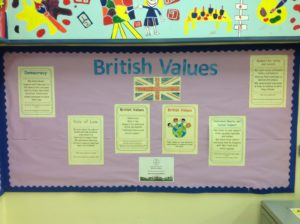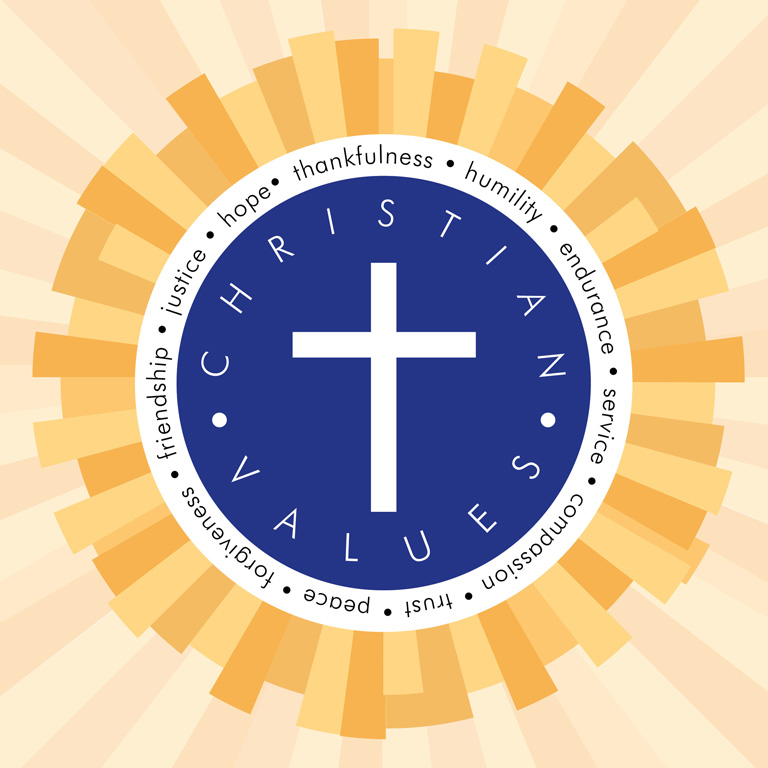Curriculum and British Values
Federation of Spofforth & Follifoot CE (VC) Primary Schools
British Values & The Prevent Agenda
Definitions
|
Ofsted |
DfE |
|
Democracy |
Respect for democracy and support for participation in the democratic process |
|
The rule of law |
Respect for the basis on which the law is made and applies in England |
|
Mutual respect |
Support for equality of opportunity for all |
|
Individual liberty |
Support and respect for the liberties of all within the law |
|
Tolerance of those with different faiths and beliefs |
Respect for and tolerance of different faiths and religious and other beliefs and cultures. |
Promotion of these Values in school
Below are some examples of how these values are promoted across our schools.
Democracy:
- A significant emphasis on developing excellent listening skills promotes the importance of listening to others which is a vital skill within the democratic process.
- Enable children to express opinions and be involved in decision making in our regular circle groups, classroom elections and in surveys.
- Children contribute to class debates as part of the English curriculum.
- Children learn about ‘people who help us’ (public services) in the early years curriculum and KS1 curriculum.
- Children are helped to develop strategies for solving perceived injustice peacefully.
- School pupil voice groups (school council, ambassadors, sports leaders etc) are selected democratically.
- Special opportunities (Yorkshire Show cheese judges) chosen democratically.
- History of democracy studies in History units e.g. Ancient Greece.
- Roles and responsibilities of key elected official (Prime Minster and Chancellor studied in different contexts)
- Children experience the democratic process in their role play – voting for their choice in different contexts (favourite foods in data collection for maths, RSPB bird election)
Rule of law:
- Children learn about and uphold the school behaviour principles and why we have them.
- They develop their understanding of right and wrong; fair and unfair in a range of meaningful contexts (both from the past and present).
- They learn that routines and rules help everyone to be safe.
- Behaviour principles are prominent around school and on our websites so they can be understood and supported by parents.
Individual liberty:
- The school ethos encourages children to develop their self- knowledge, self-esteem and self-confidence.
- ‘No hands up’ approach to speaking and listening alongside well planned adult use of nomination develops children’s understanding on the importance of everyone having a voice.
- Opinions and discussion are valued and encouraged.
- A culture where speaking and listening is valued highly and has a significant key role in the learning process helps children develop a strong understanding of the importance of individual liberty.
- Pupils are involved in direction and focus of elements of their studies and learning.
- Specific projects (Spring Fair enterprise, Arts Showcase allow children to experience directing their own learning
- Children are given opportunities for responsibilities e.g. classroom monitors, sports leaders through classroom elections.
- Participation in anti-bullying week activities each year.
- Pupil voice is promoted in our regular age appropriate circle times discussions groups.
- Difference is celebrated positively in a wide range of contexts; different interests, different achievements etc.
Respect and tolerance:
- School ethos promotes respect for all.
- Culture promotes more than tolerance. Children are taught to respect, understand and empathise.
- Spiritual, moral, social and cultural curriculum promotes respect for all cultures.
- Curriculum topics explore a range of other countries and cultures.
- Visits are made to places of worship.
- In the RE curriculum children learn about other faiths.
- Learning of British history through trips and class based learning.
- Encouraging reflection and critical thinking of learning throughout the curriculum.
- Similarities and differences between people and families, including those of different faith and ethnicity or with disabilities are discussed throughout the curriculum.
- ‘Family’ mealtimes with children sitting with others from different classes
- Remembrance day
- Philosophy for Children (P4C) encourages debate and discussion. Children learn how to listen, respect and respond to different opinions on given discussion points.
- Sporting values promoted in PE lessons and competitions – sporting values stickers and wrist bands used to highlight and celebrate
Protect from extreme views;
- A learning culture that prompts questioning and independent thinking develops children’s capacity to think for themselves and have the confidence to report and question extreme views.
- Single point of contact identified for both schools for any concerns.
- Staff training (September 2015)
- Safeguarding audit and associated action planning includes consideration of Prevent agenda
- Careful and considered planning and screening of all visiting speakers
- Staff always present to support and oversee visitors
- Materials and content from visitors reviewed before visits
- Careful planning of visits – use of recommended and approved places of worship for visits
Spiritual, Moral, Social and Cultural Development (SMSC)
Spofforth & Follifoot CE Schools both provide spiritual, moral, social and cultural development (SMSC) which includes the promotion of Universal which also includes the incorporation of British values by:
- Enabling students to develop their self-knowledge, self-esteem and self-confidence.
- Enabling students to distinguish right from wrong and to respect the civil and criminal law of England.
- Encouraging students to accept responsibility for their behaviour, show initiative, and to understand how they can contribute positively to the lives of those living and working in the locality of the school and to society more widely.
- Enabling students to acquire a broad general knowledge of and respect for public institutions and services in England.
- Encouraging further tolerance and harmony between different cultural traditions by enabling students to acquire an appreciation of and respect for their own and other cultures.
- Encouraging respect for other people.
- Encouraging respect for democracy and support for participation in the democratic processes, including respect for the basis on which the law is made and applied in England.


